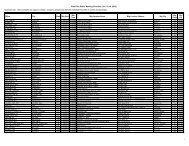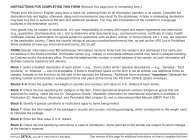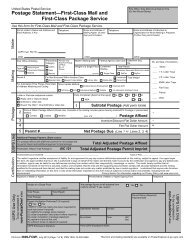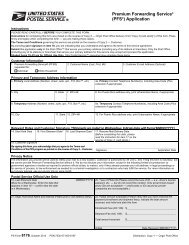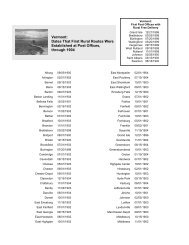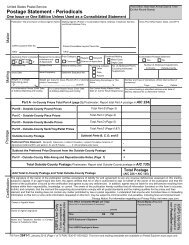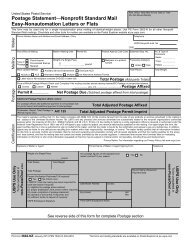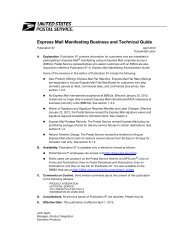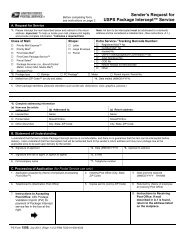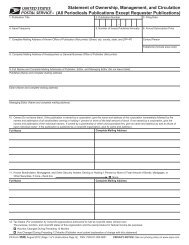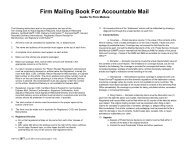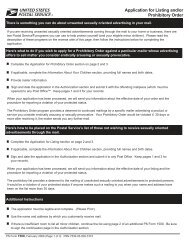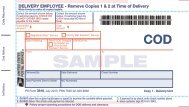Postal Bulletin 22144 - December 23, 2004 - USPS.com
Postal Bulletin 22144 - December 23, 2004 - USPS.com
Postal Bulletin 22144 - December 23, 2004 - USPS.com
Create successful ePaper yourself
Turn your PDF publications into a flip-book with our unique Google optimized e-Paper software.
POSTAL BULLETIN <strong>22144</strong> (12-<strong>23</strong>-04)<br />
<strong>23</strong><br />
Community Relations Publicity Kit<br />
Black History Month/Marian Anderson<br />
Thurgood Marshall (January 7,<br />
2003)<br />
Marshall is one of the best-known<br />
lawyers in the history of civil rights<br />
in America. In 1954 Marshall and<br />
his legal team prevailed in the landmark<br />
Supreme Court case, “Brown<br />
v. Board of Education of Topeka,<br />
Kansas,” that struck down segregation<br />
in public schools. He was the<br />
first African American to serve as a<br />
U.S. Supreme Court Justice.<br />
Marian Anderson (January 27,<br />
2005)<br />
Marian Anderson is known as one<br />
of the nation’s greatest classically<br />
trained singers of the 20 th century<br />
and is an important figure in the<br />
struggle of Black Americans for<br />
racial equality.<br />
Langston Hughes (February 1,<br />
2002)<br />
Hughes is acclaimed for his vivid<br />
portrayals of Black America from<br />
the Harlem Renaissance to the<br />
Civil Rights era. A noted poet, novelist,<br />
and playwright, he is regarded<br />
as one of the most important<br />
writers of the 20 th century.<br />
Paul Robeson (January 20, <strong>2004</strong>)<br />
Robeson is remembered not only<br />
for his extraordinary talents as an<br />
actor, singer, and athlete but also<br />
for his tireless and un<strong>com</strong>promising<br />
<strong>com</strong>mitment to civil rights and<br />
social justice. In addition to his famous<br />
repertoire of spirituals,<br />
Robeson became well known for<br />
performing and interpreting folk<br />
songs from around the world.<br />
Speech Segment and Talking Points<br />
Use talking points for speeches at local ceremonies<br />
and events to support Black History Month/Marian<br />
Anderson stamp.<br />
[Recognize participants from other organizations.]<br />
America’s greatest strength is the diversity of its people.<br />
February is Black History Month, and this is the perfect time<br />
to stop and reflect upon the rich cultural legacy African<br />
Americans have contributed to our nation.<br />
In reality, every month is a celebration of the many African<br />
Americans who were instrumental in shaping America’s<br />
history, arts, music, and literature. That is why the<br />
<strong>Postal</strong> Service is so proud to help celebrate Black History<br />
Month with the release of the newest stamp in our Black<br />
Heritage series.<br />
This year, the 28th year in this historic series, we are issuing<br />
the Marian Anderson <strong>com</strong>memorative stamp. Anderson<br />
joins 27 other honorees as a part of this series saluting<br />
outstanding African-American activists, theorists, writers,<br />
educators, and leaders.<br />
Marian Anderson is remembered as one of the nation’s<br />
greatest classically trained singers of the 20 th century, and<br />
she is also an important figure in the struggle of African<br />
Americans for racial equality. She was the first black singer<br />
to appear on the stage of New York’s Metropolitan Opera.<br />
She later published a successful autobiography, “My Lord,<br />
What a Morning.” Anderson performed at an inaugural ceremony<br />
for President Eisenhower’s second term and for the<br />
inauguration of President Kennedy.<br />
It is significant the First-Day-of-Issue ceremony for the<br />
Marian Anderson stamp was held at Washington, DC’s<br />
Constitution Hall. In 1939, the Daughters of the American<br />
Revolution sparked national protests when they refused to<br />
allow Anderson to sing at Constitution Hall. In response,<br />
the United States Department of the Interior, with the encouragement<br />
of First Lady Eleanor Roosevelt, arranged a<br />
concert at the Lincoln Memorial. An estimated 75,000<br />
people attended, and millions more heard it on the radio.<br />
The episode caused the media to look more closely at<br />
cases of discrimination involving Anderson and other<br />
African-American performers. Anderson finally sang at<br />
Constitution Hall before a capacity crowd in 1953.




